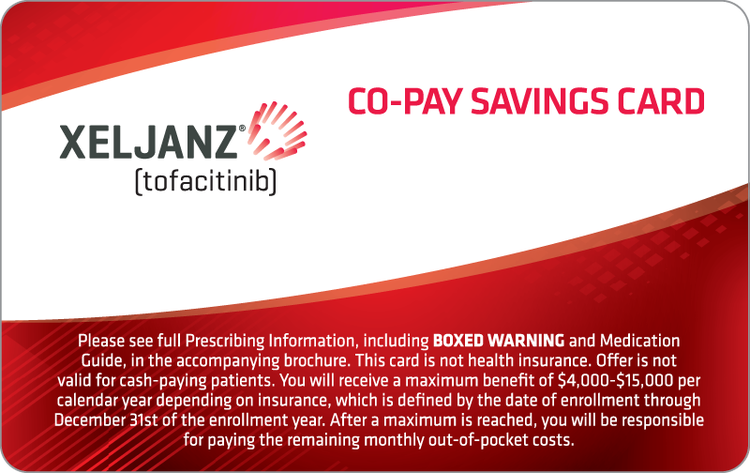
Considering a Different Treatment For Your Child's Active Polyarticular Course Juvenile Idiopathic Arthritis (pcJIA) or Juvenile Psoriatic Arthritis (jPsA)?
Ask your child's doctor about XELJANZ —the first and only JAK inhibitor approved to treat active pcJIA or jPsA in children 2 and older when TNF blockers did not work well or could not be tolerated.
How is XELJANZ available to be prescribed for children 2 and older with active pcJIA or jPsA?
Who Is It For?
children 2 and older
weighing at least 22 lb.
How Is It Delivered?
oral solution, grape-flavored
Always use the oral dosing syringe that comes with XELJANZ oral solution to measure and take your prescribed dose. Ask your healthcare provider or pharmacist to show you how to measure your prescribed dose if you are not sure.
When Is It Taken?
2 times a day, with or without food
Who Is It For?
children 2 and older
weighing at least 88 lb.
How Is It Delivered?
Pill
When Is It Taken?
2 times a day, with or without food
If you take too much XELJANZ or XELJANZ oral solution, call your healthcare provider or go to the nearest hospital emergency room right away
XELJANZ XR should not be used instead of XELJANZ oral solution
Questions About XELJANZ and XELJANZ oral solution
The safety information below applies to all marketed formulations of XELJANZ. Specific risks associated with certain dosing are noted.
Serious infections. XELJANZ can lower the ability of your immune system to fight infections. Do not start taking XELJANZ if you have any kind of infection unless your healthcare provider tells you it is okay. Serious infections have happened in people taking XELJANZ. These serious infections include tuberculosis (TB) and infections caused by bacteria, fungi, or viruses that can spread throughout the body. Some people have died from these infections. Your healthcare provider should test you for TB before starting and during treatment with XELJANZ. You should not start taking XELJANZ if you have any kind of infection unless your healthcare professional tells you it is okay.
Before and after starting XELJANZ, tell your doctor if you are being treated for an infection, have infections that keep coming back, or have symptoms of an infection, including:
- fever, sweating, or chills
- cough
- blood in phlegm
- warm, red, or painful skin or sores on your body
- burning when you urinate
- urinating more often than normal
- muscle aches
- shortness of breath
- weight loss
- diarrhea or stomach pain
- feeling very tired
Increased risk of death in people 50 years of age and older who have at least 1 heart disease (cardiovascular) risk factor and are taking XELJANZ 5 mg or 10 mg twice daily.
Cancer and immune system problems. XELJANZ may increase your risk of certain cancers by changing the way your immune system works. Lymphoma and other cancers, including skin cancers, can happen. People taking XELJANZ 5 mg or 10 mg twice daily have a higher risk of certain cancers including lymphoma and lung cancer, especially if you are a current or past smoker. Tell your healthcare provider if you have ever had any type of cancer.
Higher dose. People with ulcerative colitis taking the higher dose of XELJANZ (10 mg twice daily) or XELJANZ XR (22 mg one time each day) have a higher risk of serious infections, shingles, or skin cancers.
Increased risk of major cardiovascular events such as heart attack, stroke or death in people 50 years of age and older who have at least 1 heart disease (cardiovascular) risk factor and are taking XELJANZ 5 mg or 10 mg twice daily, especially if you are a current or past smoker.
Get emergency help right away if you have any symptoms of a heart attack or stroke while taking XELJANZ, including:
- discomfort in the center of your chest that lasts for more than a few minutes, or that goes away and comes back
- severe tightness, pain, pressure, or heaviness in your chest, throat, neck, or jaw
- pain or discomfort in your arms, back, neck, jaw, or stomach
- shortness of breath with or without chest discomfort
- breaking out in a cold sweat
- nausea or vomiting
- feeling lightheaded
- weakness in one part or on one side of your body
- slurred speech
Blood clots in the lungs (pulmonary embolism, PE), veins of the legs (deep vein thrombosis, DVT), and arteries (arterial thrombosis) have happened more often in people who are 50 years of age and older and with at least 1 heart disease (cardiovascular) risk factor taking XELJANZ 5 mg or 10 mg twice daily. Blood clots in the lungs have also happened in people with ulcerative colitis. Some people have died from these blood clots.
- Stop taking XELJANZ and tell your healthcare provider right away if you have any signs and symptoms of blood clots such as sudden shortness of breath, difficulty breathing, chest pain, swelling of a leg or arm, leg pain or tenderness, or red or discolored skin in the leg or arm.
Tears (perforation) in the stomach or intestines. Tell your healthcare provider if you have had diverticulitis (inflammation in parts of the large intestine) or ulcers in your stomach or intestines. Some people taking XELJANZ can get tears in their stomach or intestine. This happens most often in people who also take nonsteroidal anti-inflammatory drugs (NSAIDs), corticosteroids, or methotrexate. Tell your healthcare provider right away if you have fever, stomach-area pain that does not go away, and a change in your bowel habits.
Serious allergic reactions can occur. Stop using XELJANZ and call your healthcare provider right away if you have swelling of your lips, tongue, throat, or get hives.
Changes in certain lab test results. Your doctor should do blood tests to check your white and red blood cells before starting and while you are taking XELJANZ. Your doctor should also check certain liver tests. You should not take XELJANZ if your lymphocyte count, neutrophil count, or red blood cell count is too low or your liver function test levels are too high. Changes in lab test results may cause your healthcare provider to stop your XELJANZ treatment for a time. Your cholesterol levels should be checked 4 to 8 weeks after you start receiving XELJANZ.
These are not all of the possible side effects of XELJANZ/XELJANZ oral solution. Learn more and read the Medication Guide.
Before you use XELJANZ, tell your healthcare provider if you:
- Are being treated for an infection, have an infection that won’t go away or keeps coming back, or think you have symptoms of an infection
- Have TB, or have been in close contact with someone with TB, or were born in, lived in, or traveled where there is more risk for getting TB
- Have diabetes, chronic lung disease, HIV, or a weak immune system. People with these conditions have a higher chance for infections
- Live or have lived in certain areas (such as Ohio and Mississippi River Valleys and the Southwest) where there is an increased chance for getting certain kinds of fungal infections
- Have or have had Hepatitis B or C
- Are a current or past smoker
- Have had any type of cancer
- Have had a heart attack, other heart problems or stroke
- Have had blood clots
- Have liver or kidney problems
- Have any stomach area (abdominal) pain or been diagnosed with diverticulitis or ulcers in your stomach or intestines
- Have recently received or plan to receive a vaccine. People taking XELJANZ should not receive live vaccines but can receive non-live vaccines
- Are pregnant, planning to become pregnant, breastfeeding, or planning to breastfeed. You should not take XELJANZ and breastfeed
- Have had a reaction to tofacitinib or any of the ingredients
- Are taking other medicines, including prescription and over-the-counter medicines, vitamins, and herbal supplements. Especially tell your healthcare provider if you take any of the following medicines while taking XELJANZ since this may increase your risk of infection:
- tocilizumab (Actemra®)
- etanercept (Enbrel®)
- adalimumab (Humira®)
- infliximab (Remicade®)
- rituximab (Rituxan®)
- abatacept (Orencia®)
- anakinra (Kineret®)
- certolizumab (Cimzia®)
- golimumab (Simponi®)
- ustekinumab (Stelara®)
- secukinumab (Cosentyx®)
- vedolizumab (Entyvio®)
- ixekizumab (Taltz®)
- sarilumab (Kevzara®)
- azathioprine, cyclosporine, or other immunosuppressive drugs
- Tell your healthcare provider if you are taking medicines that affect the way certain liver enzymes work. Ask your healthcare provider if you are not sure if your medicine is one of these.
These are not all of the possible side effects of XELJANZ/XELJANZ oral solution. Learn more and read the Medication Guide.
See Most Important Information I should know about XELJANZ/XELJANZ oral solution
If you are a carrier of the Hepatitis B or C virus (viruses that affect the liver), the virus may become active while you use XELJANZ. Your healthcare provider may do blood tests before starting and while using treatment with XELJANZ. Tell your healthcare provider if you have any signs of these symptoms: feel very tired, little or no appetite, clay-colored bowel movements, chills, muscle aches, skin rash, skin or eyes look yellow, vomiting, fevers, stomach discomfort, or dark urine.
Common side effects in children (2 & older) with polyarticular course juvenile arthritis and psoriatic arthritis include upper respiratory tract infections (common cold, sinus infections), nasal congestion, sore throat, and runny nose (nasopharyngitis), headache, fever, nausea, vomiting, and acne.
These are not all of the possible side effects of XELJANZ/XELJANZ oral solution. Learn more and read the Medication Guide.
tokenbuilder: AEM-xeljanz_staging-builder-pjia-signup-config
tokenpjia: AEM-xeljanz_staging-pjia-signup-config
tokencopaypjia: AEM-xeljanz_staging-pjia-signup-copay-config
tokenbuilder: xeljanz_signup-pcjia-config
tokenpjia: xeljanz_uat-pjia-signup-config
tokencopaypjia: xeljanz_uat-pjia-signup-copay-config
tokenbuilder: form_builder__production__685__wd
tokenpjia: xeljanz_prod-pjia-signup-config
tokencopaypjia: xeljanz_prod-pjia-signup-copay-config
Savings & Support
Is your child (age 2 or older) starting on treatment with XELJANZ for pcJIA or jPsA, but you’re concerned about covering the cost? You may be eligible for the XELJANZ Co-Pay Savings Program for commercially insured patients or qualify for other financial support resources to help your child access their treatment. Terms and conditions and eligibility requirements apply.
Pay as little as $0 per month for your child's XELJANZ prescription*
†Eligibility required. May have annual savings up to $4,000-$15,000 depending on insurance.
Federal and state healthcare beneficiaries ineligible. No membership fee. Offer not valid
for cash paying patients. Terms and conditions apply.
Sign up for the XELJANZ Co-Pay Savings Program, if Eligible
Has your child’s doctor prescribed XELJANZ for their pcJIA or jPsA treatment? Our Co-Pay Savings Program† may reduce out-of-pocket cost for eligible, commercially insured caregivers of children (ages 2 and older) who have been prescribed XELJANZ for pcJIA or jPsA. Eligibility requirements apply.

If you are unable to confirm your eligibility or have additional questions, call XELSOURCE at 1-844-935-5269.
†For eligible underinsured or uninsured patients, XELSOURCE may offer financial assistance through the Pfizer Patient Assistance Program. Call XELSOURCE to learn more about these programs. Terms and conditions/eligibility requirements apply.
For additional support, there’s XELSOURCE
You may need a little extra help getting started after your child has been prescribed XELJANZ.
Call XELSOURCE for help:
- Contacting your insurance company on your behalf
- Helping investigate and assess your eligibility for coverage when needed
- Confirming your out-of-pocket costs
- Assisting you with obtaining Prior Authorization (PA) when needed
- Providing a patient portal at xelsourcepatientportal.com to allow you to monitor the status of your XELJANZ prescription once received by XELSOURCE
Ready to fill your XELJANZ prescription? See where you are in the process
To speak to someone at XELSOURCE about your insurance coverage and XELJANZ costs for your child, Monday through Friday, 8:00 AM-8:00 PM ET, call 1-844-935-5269 and say "Representative."
MONDAY-FRIDAY, 8:00 AM–8:00 PM ET
Mon-Fri, 8am - 8pm ET
Share Your Story
Has your child, age 2 or older, been diagnosed with active polyarticular course juvenile idiopathic arthritis or juvenile psoriatic arthritis, and been prescribed XELJANZ? We want to hear from you!
Your story is important—particularly for other caregivers who are considering treatment for their children. If selected, your story may appear on XELJANZ.com and/or in other marketing materials. Certain criteria must be met for consideration.
Email us at [email protected] or call 1-800-674-3194.
